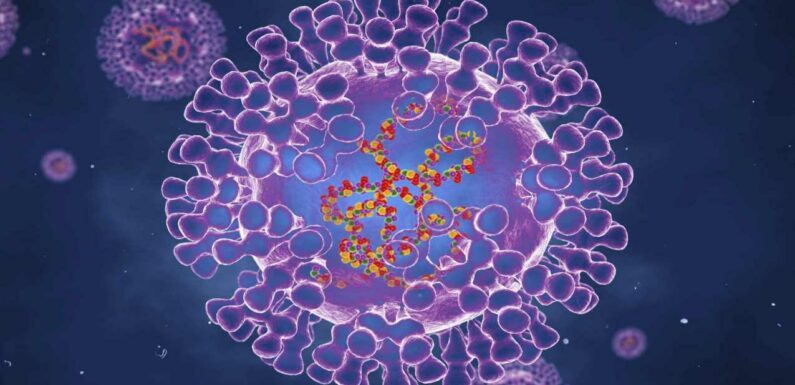
MONKEYPOX could cause long-term neurological problems, a new study has warned.
New analysis has revealed the bug could cause serious brain damage which can lead paralysis and even death.
There are now at least 3,413 known cases of the bug in the UK.
Officials recorded an average of 10 new infections a day last week across the country, down from 21 the week before.
However, medics in the US have warned that those who catch the virus are still at risk of viral encephalitis – a condition which causes inflammation of the brain.
The illness – known to cause confusion and seizures – has already killed three people after they contracted the current monkeypox strain.
Read more on monkeypox
How to spot monkeypox rashes on different skin tones revealed
From monkeypox to painful lumps – Dr Jeff answers your health questions
In the review of possible neurological complications of monkeypox, experts noted those who catch the bug are also at risk of a serious inflammatory disorder called myelitis.
Myelitis can lead to permanent physical disabilities, such as muscle stiffness, loss of bowel or bladder function, muscle weakness, or even paralysis.
There have been no reports of people with monkeypox developing the neurological condition – as of yet.
However, expert said that based off known neurologic complications of other similar viruses, like smallpox, we "must be prepared for the possibility".
Most read in Health
Alarm as new research links MILD Covid with dangerous heart conditions
Warning as admissions for Victorian disease surge – 4 signs you mustn't ignore
My baby girl went to bed 'happy and healthy' but never woke up
I ‘died’ SEVEN times and lost my leg after suffering a groin strain
The medics from the National Institutes of Health in Bethesda, Maryland also warned that people who catch monkeypox are at risk of Guillain-Barré syndrome.
Much like with myelitis, there have been no reports of people with monkeypox developing Guillain-Barré syndrome as of yet.
But experts believe it could be a side effect of the vaccine.
Previously, people have developed Guillain-Barré syndrome after being jabbed with the smallpox vaccine – which could be used to prevent monkeypox.
Though newer and safer than previous vaccines the researchers said clinicians should remain vigilant of any adverse reactions to the jabs being used in the current vaccine programmes.
Guillain-Barré syndrome is a very rare and serious condition that affects the nerves.
It mainly affects the feet, hands and limbs, causing problems such as numbness, weakness and pain.
In severe cases, it can leave people struggling to move, walk, breathe or swallow.
Other known neurological side effects of monkeypox includes headaches, nerve pain and mood disorders such as depression and anxiety, researchers added,
Those with compromised immune systems, such as some people living with HIV or AIDS, are particularly at risk as the monkeypox virus.
This is because the bug may be able to stay in the body for longer or more able to invade the nervous system, the researchers said.
Previous research has suggested there is not yet enough evidence to estimate how common brain issues are in the current outbreak in the UK.
It was recently revealed that a second strain of the illness had been detected in the UK.
The person who has the variant had recently been to West Africa, medics at the UK Health Security Agency (UKHSA) said.
Read More on The Sun
Watch the moment Holly and Phil ‘jump the HUGE queue to see the Queen’s coffin’
William & Harry have a ‘forgotten’ stepsister & she was at the Queen’s funeral
There are two major known variants of the virus, Clade I and Clade II — with the latter being the less severe version.
UKHSA said no Clade I cases have been detected in the UK, adding Clade II is responsible for the current outbreak, which has reportedly been slowing down in recent weeks.
Source: Read Full Article








